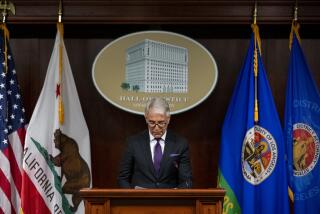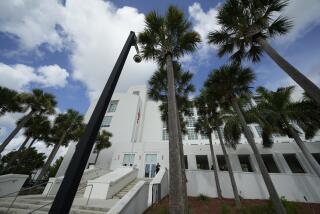Detainee lawyers see stacked deck
GUANTANAMO BAY, CUBA — The rules governing war-crimes trials here require defense lawyers and prosecutors to inform each other of witnesses they will call and evidence they will present at the military commissions.
But the vague guidance on the process known as discovery doesn’t impose any obligation to make timely disclosures. Nor does it oblige the government to make its witnesses available to the defense for pretrial interviews.
Unique to the tribunal system that is governed by neither U.S. criminal law nor the Uniform Code of Military Justice, the commissions allow liberal use of classified evidence that a defendant doesn’t get to see and protective orders that shield the identity of witnesses, interrogators and informants.
Defense lawyers for the terrorism suspects contend that the deck is stacked against them in preparing their cases. They say the administration officials running the tribunals can hide critical information and helpful testimony from the defense.
The extent to which the government can thwart defense preparation became apparent last week just 36 hours before the Thursday arraignment of Canadian war-crimes suspect Omar Khadr. His Navy lawyer, Lt. Cmdr. William C. Kuebler, learned then that the commissions’ hierarchy had known for five years of a U.S. government employee who was an eyewitness to the 2002 firefight in Afghanistan in which Khadr is accused of having thrown the grenade that killed a U.S. Special Forces medic.
The eyewitness’ account contradicts the government version of events and could exonerate Khadr of the war crimes with which he is charged: murder, attempted murder, conspiracy, spying and material support for terrorism.
“They weren’t going to tell us who he was or how to get in touch with him or where he was,” said Kuebler, who has been lobbying the Canadian government to demand repatriation of his client so he can be tried “in a legitimate system.”
“This is a process that’s not designed to be fair; it’s designed to produce convictions,” Kuebler added.
Kuebler described as “draconian” the government’s use of protective orders -- a move to shield evidence on grounds that its disclosure would reveal intelligence tactics, undermine security or pose a risk to the person providing it.
Affidavits sworn by bounty hunters in Pakistan who turned over more than 200 of Guantanamo’s prisoners in exchange for sums upward of $5,000 are among the classified documents that neither defendants nor trial observers are allowed to see.
That withholding of classified information from the defense and the public has resulted in many of the 305 prisoners here remaining in detention for nearly six years without knowing exactly what they are accused of or who made the accusations.
The evidence’s chain of custody, which often began with rival Afghan warlords, coupled with its secretive handling by federal agencies, has intensified criticism of the tribunals and the practice of indefinite detention from defense lawyers, human rights advocates and legal scholars.
Such handling of discovery and classified evidence in the commissions “would be virtually inconceivable in federal criminal courts” in the United States, said Miles C. Fischer, who observed the Khadr arraignment for the American Bar Assn. He said a five-year delay in the government’s providing potentially exculpatory evidence to the defense would probably constitute prosecutorial misconduct in the eyes of many civilian judges.
Federal criminal courts are also subject to political pressures from the U.S. attorney general and other administration officials to produce convictions, but such intrusions are perceived to be more effective in the commissions because a military chain of command overlays the relationships among the parties. As Kuebler pointed out in discussing his struggle to earn Khadr’s trust, the lawyer wears the same U.S. military uniform as prosecutors, court administrators and the soldiers who arrested Khadr and patrol his cellblock.
The administration’s quest to deliver showcase convictions of alleged war criminals ahead of next year’s election was a factor in the former chief prosecutor quitting the job two months ago. Air Force Col. Morris Davis cited what he considered inappropriate political pressures on the legal process in his decision to seek reassignment.
The only conviction secured by the commissions was the March plea bargain that sent Australian prisoner David Hicks home to serve a sentence that ends next month -- another political intervention by the Bush administration as a favor to Australian Prime Minister John Howard.
Commissions officials, who have experienced repeated personnel turnovers over the last six years, reply to questions about the unique disclosure rules by quoting the Manual for Military Commissions’ vague guidance.
“Discovery is a continuing obligation of both parties,” said Navy Lt. Catheryne Pully, the third military lawyer to serve as commissions legal advisor and spokesperson this year. “If the defense believes that the government has not complied with the discovery rules, they can file a motion with the court for appropriate relief at any time.”
Chief defense lawyer for the commissions, Army Col. Steve David, criticized the tribunal structure that allows agencies of the federal government to preclude its agents from sharing evidence or intelligence that might be helpful to the defense. In the Khadr case, an FBI agent scheduled to testify has refused to meet with Kuebler.
David also expressed dismay at the dearth of lawyers he has to defend Guantanamo prisoners. Whereas the prosecution has about 30 attorneys on its staff, David has six -- and two will be leaving soon.
Like his predecessors in the job he inherited less than two months ago, David complained that the commissions were constantly in need of revision and devoid of precedent. He also lamented the admissibility of hearsay, evidence obtained through techniques he considers torture and defendants’ lack of rights to see all evidence against them or to confront their accusers.
The legacy of the commissions is at risk, David said, of becoming a shameful parable of how “in these times of fear and uncertainty, we allowed those emotions to create fear of the rule of law.”
More to Read
Sign up for Essential California
The most important California stories and recommendations in your inbox every morning.
You may occasionally receive promotional content from the Los Angeles Times.










